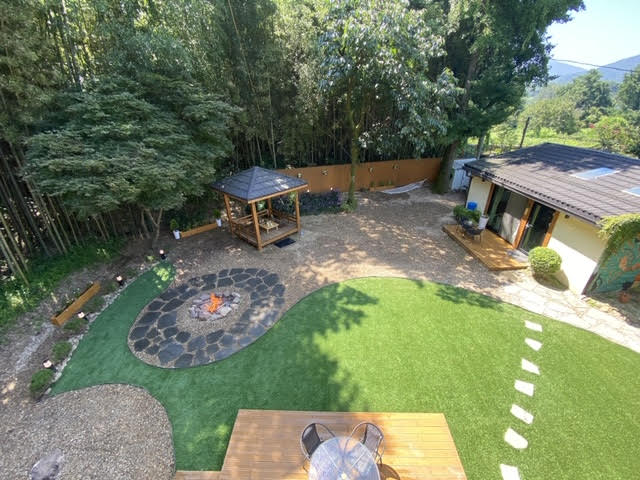The Damyang House
Interview with Sean Walker
Interview by Melline Galani.
Located in a small, traditional Korean countryside village, The Damyang House is a must-see retreat from the summer heat or the winter cold. Started as a small project of two brave and strong-willed individuals, it has now become a well-known, relaxing destination for expats around Korea. The Gwangju News conducted and presents here a short interview with the one responsible for The Damyang House, Sean Walker. — Ed.
Gwangju News (GN): Thank you for taking the time to do this interview. First, please introduce yourself and tell us about your academic background. Also, please tell us about your first encounters with Gwangju and South Korea.
Sean Walker: My name is Sean Walker and I am an American living in Jeollanam-do for nearly 20 years. Like most, I originally came here to teach, and I have an MA in TESOL. After a year and a half working at a friend’s hagwon in Suncheon, I moved to Gwangju and spent 15 years working at Chonnam National University (CNU). I have since left CNU to pursue opportunities outside of teaching.
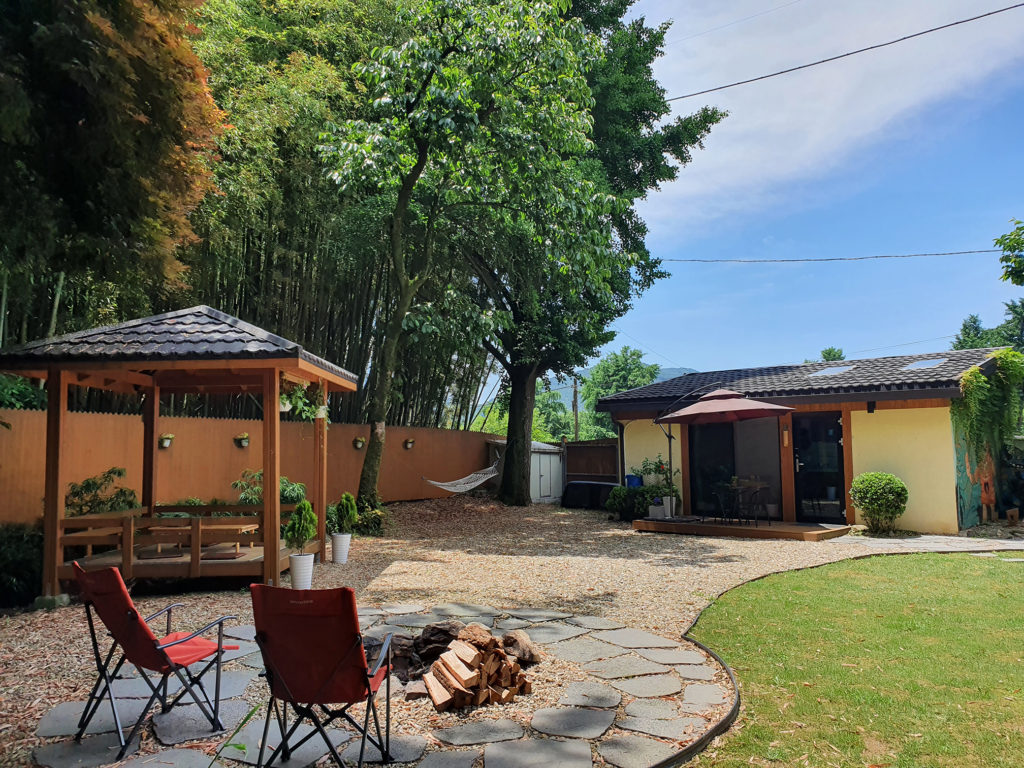
GN: Was it hard to quit your job, leaving behind the city lifestyle, to move to the countryside?
Sean Walker: With yearly contracts, teaching in Korea never felt like a very stable career choice, so I always made sure I had a “Plan B.” I was able to transition out of teaching slowly, so it was not difficult; I already had a working business model to focus on and continue to develop as well as other investments and projects.
Moving to the countryside was a much more difficult decision. My wife and I have both lived only in cities, and there was a fear that living in the countryside would be isolating. Also, the thought of giving up delivery food was terrifying. Fortunately, access to the city is quick and easy in Korea, and there has never been a shortage of friends wanting to visit us in the countryside.
GN: How did you come up with the idea for The Damyang House?
Sean Walker: The business model for The Damyang House happened organically over time. Initially, it was just an opportunity to invest in real estate and possibly build a summer home. After the first stages of renovating were finished, we could see that we had accomplished the “cabin in the woods” feel, and the uniquely private garden surrounded by a bamboo forest made it all perfect for a vacation rental.
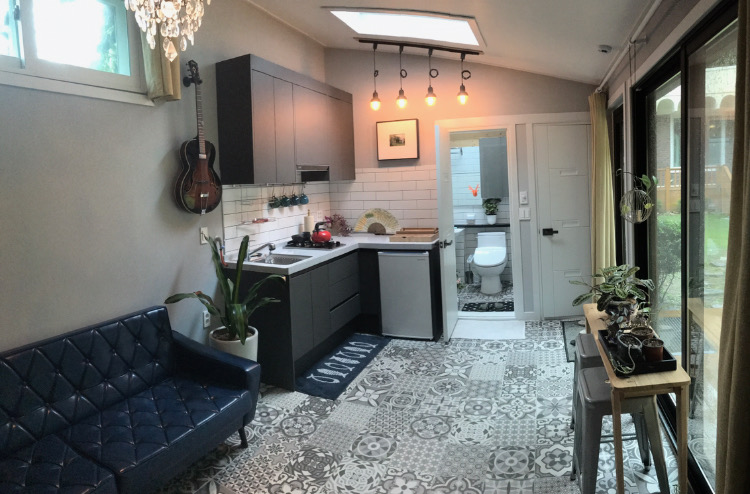
GN: What were the main hardships you faced when you started this business? Any tips for other local entrepreneurs?
Sean Walker: The biggest hardship was the fact that there are not many resources available for buying and renovating an abandoned house. It is not nearly as common as it is back home [in the United States]. Because of that, there was not much support from friends and family, as spending your life savings on an abandoned house in the countryside is not generally considered a wise financial decision. Thankfully, my wife and I are both stubborn and were happy to stumble through the process on our own. If you plan to do anything that is considered “outside the box,” be prepared for an uphill battle, especially in Korea, where fairly ridged lifestyle expectations are the norm.
GN: How was the whole process of restoring the old house and the former storage unit?
Sean Walker: We have done the renovations at The Damyang House in stages over the last eight years, and have also been involved in other major renovation projects (an apartment in Gwangju and a bar in Seoul), so over time, we have gotten better at it. We always hired contractors directly and did the design work ourselves, which is much cheaper, but also requires you to deal with 100 percent of the decision-making. This can be challenging if you do not know what the options are in Korea. We spent a lot more money to renovate the guesthouse because we learned the cheapest option is not always the best one!
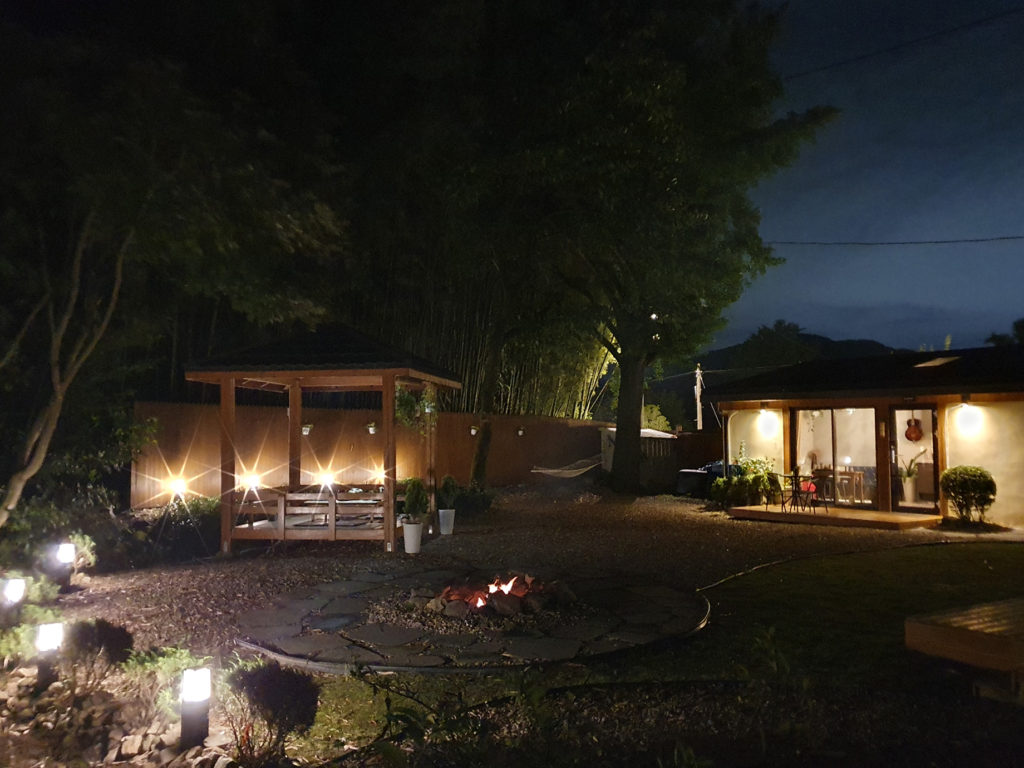
GN: Who are your target customers and how do you connect with them? What are the main advertising methods you rely on?
Sean Walker: Our target customers are mostly English-speaking couples and small families/groups that do not necessarily have access to the network of minbak (small pensions) and pensions around Korea. We host a lot of U.S. military families that appreciate the backyard BBQs, campfire, and space for their children and dogs to run around.
In the past, we were a lot more creative with marketing and advertising and would sponsor events or host our own events. Now we have active Instagram and Facebook pages with daily updates, but mostly we operate through word-of-mouth and recommendations.
GN: What makes The Damyang House special compared to other minbak? Are there any special programs included in the rental price or offered as side services?Sean Walker: Mostly, we offer a private garden, so you do not have to share your minbak with a dozen other families! Other than that, we are also pet friendly and have a fire pit (firewood included), eight-foot above-ground swimming pool, outdoor theater for movies around a campfire, and a two-person kayak. We also offer transfer services from the bus and train stations and are happy to help organize hiking/cycling trips or recommend restaurants and make reservations for non-Korean speakers.
GN: What makes The Damyang House special compared to other minbak? Are there any special programs included in the rental price or offered as side services?
Sean Walker: Mostly, we offer a private garden, so you do not have to share your minbak with a dozen other families! Other than that, we are also pet friendly and have a fire pit (firewood included), eight-foot above-ground swimming pool, outdoor theater for movies around a campfire, and a two-person kayak. We also offer transfer services from the bus and train stations and are happy to help organize hiking/cycling trips or recommend restaurants and make reservations for non-Korean speakers. We also organize and cook Jeolla style BBQ (extra fee), organize kayak/fishing trips and Jeep transport in the neighborhood areas.
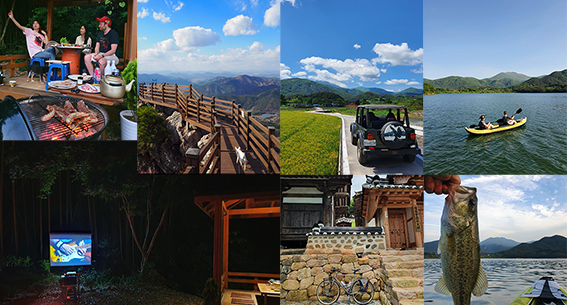
GN: The pension can accommodate only three people (or a family with two children at most). Is this not an impediment to increasing the number of clientele? What are the advantages of keeping it a small operation?
Sean Walker: The biggest advantage of a smaller operation is that we can continue to live in the countryside and enjoy a much more relaxing lifestyle. However, in the past, we lived in the city and rented both the main house and guesthouse, so we were able to host larger families or groups. We would like to move back to the city and return to this business model in 2021, but expanding our business in the middle of a pandemic is not easy.

GN: Since we are in the middle of this COVID-19 pandemic, please tell us how this situation has affected your business.
Sean Walker: We strictly follow all the recommended guidelines and protocols, but unfortunately, COVID-19 has forced many cancellations this year. Like most business owners, we are anxiously waiting for the pandemic to end.
GN: Are there any other entrepreneurial activities that you are involved in besides The Damyang House?
Sean Walker: We also co-own a bar in Itaewon called Blacklist and manage a two-flat rental property in America. Next year, we are hoping to open a Naver store with bamboo products made from the bamboo surrounding The Damyang House. We also recently finished a business plan for a restaurant concept we would like to open in America if it is ever safe to return!
GN: Thank you, Sean, for sharing with us what The Damyang House is and how it came about. It sounds like a great summer getaway!
Photographs courtesy of Sean Walker.
The Interviewer
Melline Galani is a Romanian enthusiast, born and raised in the capital city of Bucharest, who is currently living in Gwangju. She likes new challenges and learning interesting things, and she is incurably optimistic. Instagram: @melligalanis




